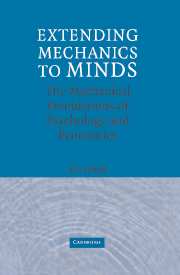Book contents
- Frontmatter
- Contents
- Preface
- Outline of the book
- Part I Reconciling Natural and Mental Philosophy
- Part II Reconstructing Rational Mechanics
- Part III Mechanical Minds
- Part IV The Metaphysics of Mechanics
- 15 Materialism
- 16 Reductionism
- 17 Effectiveness
- 18 Finitism
- Part V Conclusion of the Matter
- System of Notation
- Bibliography
- Index
15 - Materialism
from Part IV - The Metaphysics of Mechanics
Published online by Cambridge University Press: 21 September 2009
- Frontmatter
- Contents
- Preface
- Outline of the book
- Part I Reconciling Natural and Mental Philosophy
- Part II Reconstructing Rational Mechanics
- Part III Mechanical Minds
- Part IV The Metaphysics of Mechanics
- 15 Materialism
- 16 Reductionism
- 17 Effectiveness
- 18 Finitism
- Part V Conclusion of the Matter
- System of Notation
- Bibliography
- Index
Summary
Science and natural philosophy largely abandoned ideas about parallel worlds of mind and matter in the years following Descartes and his dualistic philosophy. By the twentieth century, most of science exhibited an unhesitant materialistic metaphysics. The present investigation occasions an opportunity to reexamine ideas about materialism.
What is materialism?
The standard conception of materialism is the thesis that all events in the world consist of ordinary physical matter, energy, and other physical properties, denying the existence or causal influence of other things. It does not deny the possibility of using nonphysical properties to characterize physical things; civilization's use of numbers to quantify physical dimensions would suffer greatly were this so. But it does deny that these nonphysical characterizations play any physical role.
One should note that materialism exhibits an open-ended character. When philosophers first bruited materialism, it referred to everything being the tangible, visible stuff of the world. Eventually this conception required enlargement to include the invisible, intangible stuff—energy, electromagnetic fields, spin, neutrinos—that later physics developed as physical entities or properties, even though some of these are far removed from the direct experience characteristic of the original conceptions of physical materials.
- Type
- Chapter
- Information
- Extending Mechanics to MindsThe Mechanical Foundations of Psychology and Economics, pp. 373 - 378Publisher: Cambridge University PressPrint publication year: 2006



